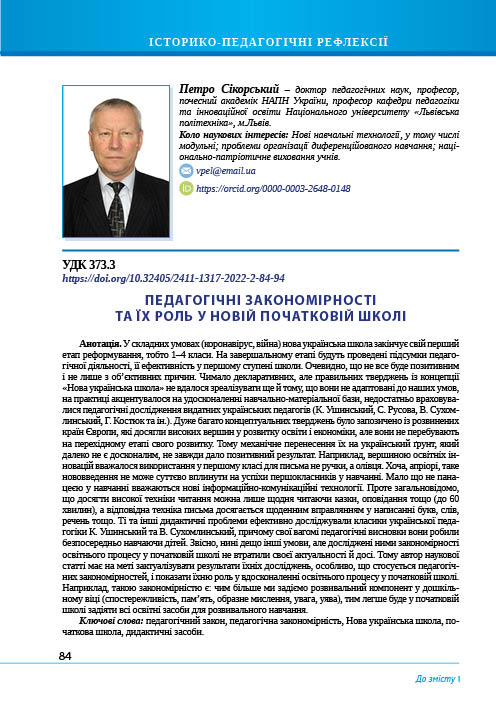Abstract
In difficult times (coronavirus, war) the new Ukrainian school completes its first stage of reform – grades 1–4. In the final stage, the results of the pedagogical activity and its efficiency in the first stage of school will be carried out. Obviously, not everything will be positive, and not just for objective reasons. Many declarative but correct statements from the concept of «New Ukrainian School» could not be realized also because they are not adapted to our conditions. In practice, much emphasis was placed on improving the educational material base, insufficient consideration of pedagogical research of prominent Ukrainian teachers (K. Ushynskyi, S. Rusova, V. Sukhomlynskyi, H. Kostiuk, etc.). Many conceptual statements have been borrowed from the developed countries of Europe, which have reached high standards in the development of education and the economy, but they are not in a transitional stage of their development. Therefore, their mechanical transfer to the Ukrainian platform, which is far from perfect, does not always bring a positive result. For example, the pinnacle of educational innovation was the use of a pencil instead of a pen in writing in the first grade. Although, such innovation cannot significantly affect the success of first-graders in learning. New information and communication technologies are almost a panacea for learning. However, it is well known that high reading technique can be achieved only by daily reading fairy tales, stories, etc. (up to 60 minutes), and the corresponding writing technique is achieved by daily practice in writing letters, words, sentences and more. Those and other didactic problems were effectively studied by the classics of Ukrainian pedagogy K. Ushynskyi and V. Sukhomlynskyi, and they made their important pedagogical conclusions by teaching children.
Of course, today the conditions are somewhat different, but the regularities of the educational process studied in them in the primary school have not lost their relevance to this day. Therefore, the author of the scientific article aims at updating the results of their research, especially with regard to pedagogical patterns, and to show their role in improving the educational process in primary school.
For example, such a pattern is: the more we use the developmental component in preschool age (observation, memory, figurative thinking, attention, imagination), the easier it will be in the primary school to use all educational tools for developmental learning.
References
Гаряча, С.А. (2010). Виховання основ етичної культури молодших школярів у навчально-виховному процесі. Початкова школа. 3. 70–71. https://nenc.gov.ua/doc/autoref/garacha2.pdf.
Павленко, В.В. (2015). Креативність учителя як чинник розвитку педагогічної творчості. Формування дидактичної компетентності педагогів дошкільної та початкової освіти: збірник науково-методичних праць. Житомир. Житомирський державний університет ім. І. Франка. 145–150. https://core.ac.uk/download/pdf/42974396.pdf с. 72].
Підласий, І.П. (2010). Педагогіка початкової школи. Київ. http://ibib.ltd.ua › zakonomernosti-pedagogicheskogo.
Савченко, О.Я. (2018). Початкова освіта в контексті ідей Нової української школи Всеукраїнський науково-практичний журнал «Директор школи, ліцею, гімназії». Том 19, № 3. https://lib.iitta.gov.ua/714505
Сухомлинський, В.О. (1977a). Вибрані твори в п’яти томах. Т. 1. Київ.
Сухомлинський, В.О. (1977b). Вибрані твори в п’яти томах. Т. 3. Київ.
Сухомлинський, В.О. (1977c). Вибрані твори в п’яти томах. Т. 4. Київ.
Ушинський, К.Д. (1983). Вибрані педагогічні твори. Т. 2 Київ.
Шадюк, О.І. (2019). Інноваційні підходи до організації наступності дошкільної та початкової ланок освіти. Інноватика у вихованні. № 10. 275–280. https://doi.org/10.35619/iiu.v1i10.162
Hariacha, S.A. (2010). Vykhovannia osnov etychnoi kultury molodshykh shkoliariv u navchalno-vykhovnomu protsesi. Pochatkova shkola. 3. 70–71. https://nenc.gov.ua/doc/autoref/garacha2.pdf.
Pavlenko, V.V. (2015). Kreatyvnist uchytelia yak chynnyk rozvytku pedahohichnoi tvorchosti. Formuvannia dydaktychnoi kompetentnosti pedahohiv doshkilnoi ta pochatkovoi osvity: zbirnyk naukovo-metodychnykh prats. Zhytomyr. Zhytomyrskyi derzhavnyi universytet im. I. Franka. 145–150. https://core.ac.uk/download/pdf/42974396.pdf s. 72].
Pidlasyi, I.P. (2010). Pedahohika pochatkovoi shkoly. Kyiv. http://ibib.ltd.ua › zakonomernosti-pedagogicheskogo.
Savchenko, O. Ia. (2018). Pochatkova osvita v konteksti idei Novoi ukrainskoi shkoly Vseukrainskyi naukovo-praktychnyi zhurnal «Dyrektor shkoly, litseiu, himnazii». Tom 19, № 3. https://lib.iitta.gov.ua/714505
Sukhomlynskyi, V.O. (1977a). Vybrani tvory v piaty tomakh. T.1. Kyiv.
Sukhomlynskyi, V.O. (1977b). Vybrani tvory v piaty tomakh. T.3. Kyiv.
Sukhomlynskyi, V.O. (1977c). Vybrani tvory v piaty tomakh. T.4. Kyiv.
Ushynskyi, K.D. (1983). Vybrani pedahohichni tvory. T.2 Kyiv.
Shadiuk, O.I. (2019). Innovatsiini pidkhody do orhanizatsii nastupnosti doshkilnoi ta pochatkovoi lanok osvity. Innovatyka u vykhovanni. № 10. 275–280. https://doi.org/10.35619/iiu.v1i10.162

This work is licensed under a Creative Commons Attribution-NonCommercial-ShareAlike 4.0 International License.


